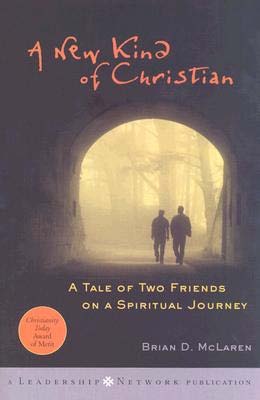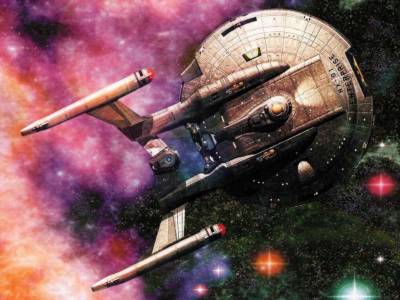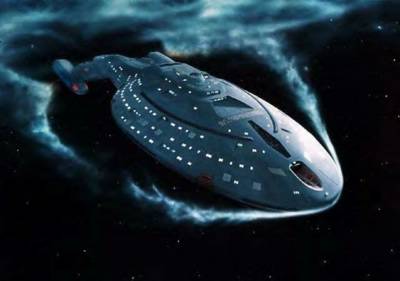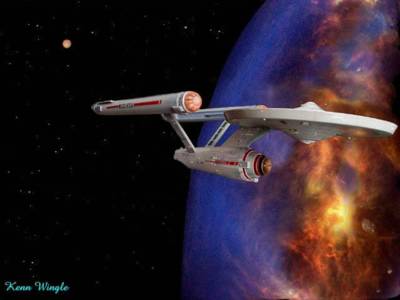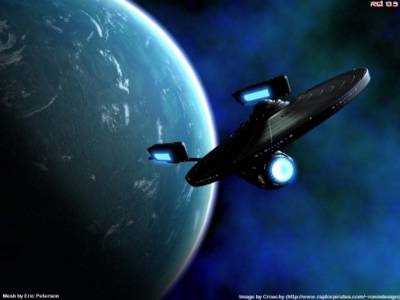
These last few examples bring up an interesting point—how the different
Treks have varied worldviews and tackle their specific dilemmas in different manners. This can be attributed to multiple factors, not the least of which is the span of time across which the shows were created. “Though set in the future, the attitudes, politics, and culture depicted in each series and film have always reflected the mores of contemporary society,” articulates Dr. Barad. “The ethical dilemmas of the
Star Trek universe enable us to better understand our own society and the presuppositions that govern it. By dramatizing these values in a 24th century setting (even to the point of exaggeration),
Star Trek provides us with a forum that’s informative as well as entertaining” (xii). In The Original Series, racial issues appear alongside episodes on Vietnam, the Cold War, the duality of man, animal rights, technology run amok, and cult fanaticism. On The Next Generation, America is a rosier place and the series reflects this, which is not to say it does not embrace the fray. Euthanasia, pop psychology, family fidelity, duty, revenge, personal identity, and suicide are just a few of the factors the show addresses. In DS9 the days of our current society are a bit bleaker and the series reflects this by being the darkest of all the
Trek progeny—so much so that many, myself included, feel that Gene Rodenberry is spinning in his grave over how his idyllic views of the future have been subverted. DS9 tackled gender issues, homosexuality, drug addiction, greed, and war as both hell and necessity. Voyager constantly hits on medical ethics, as well as genocide, interracial relationships, cloning, capital punishment, and individual rights. While only in its first season, Enterprise has already leapt head first into issues of reproduction, hunting, inter-cultural cooperation, terrorism, vengeance and religious extremism. “
Star Trek finds much to criticize about our own world’s societies, and does not pull its punches in showing us just what a mess we have made of our planet” (Barrett 200). Prophets and agents of cultural change always address the hard topics.
While the various series espouse diverse virtues ranging from Aristotelian to Kantian to Platonic, certain core threads run the length of each one:
"[W]e see that each series respects the principle that a rational being should always be treated as an end and never as a means only. Each show places a high value on the autonomy of the individual and the importance of following our duties over our desires. Each endorses the pursuit of altruism over egoistic concerns. Each recognizes the importance of intention over the consequences of an action when evaluating the morality of an action. Each show also agrees that the end does not always justify the means. In any particular situation there is always a right thing to do. All [five] shows also recognize and strive to realize the virtues of compassion, courage, justice, equity, friendship, and temperance" (Barad 351).
The ethical tapestry of
Star Trek is rich and muscular. It refuses overall classification while still retaining a distinct and unified theory that, far from arbitrary, accounts for the actions and decisions made by every character in every instance of every episode or film.
Star Trek has created a distinct and viable moral code by bringing together the most judicious principles from the totality of history. “[
Star Trek’s] overall principles,” claims Dr. Barad, “form an impetus powerful enough to provide direction for our own future” (xiii). While not perfect, this moral code is strikingly powerful enough to stand on its own—a feat astounding for life overall, let alone a television show.
Of course, drama without conflict can hardly be called drama. There is nothing exciting about a race of people who have overcome all obstacles on the way to perfection and now live their lives in a sort of personal and collective nirvana. “
Star Trek asks us to imagine with hope a future in which we have thoroughly explored the Earth and learned its lessons. By the twenty-third century, Earth has achieved peaceful, enlightened, worldwide government, with an end to all forms of discrimination based on sex, race, and species membership” (Hanley xv). Therefore,
Star Trek focuses on the journey and not the destination. Such idyllic possibilities are just over the horizon, but will not be achieved without concerted and sustained challenge. It is the birthing pains of humanity’s evolution that will produce perfection in the end. “Earth is a nice place—but is life there just a bit too easy?” (Barrett 201). And so humans leave the physical and emotional comforts of home to embrace a life of exploration, ridden with conflict and danger. “Why explore at all? Because travel broadens the mind,” pronounces Richard Hanley. “When we visit other places and other people, we often encounter different ways of living, and this provokes us to examine our own lives anew. Travel isn’t just about exploring other people and places, it’s about exploring ourselves and testing our limits” (xiv).
Star Trek takes its viewers on such voyages every week.
While many blanche at what they see as the degradation of basic values and morality in our society, we are simultaneously bombarded with issues of which our ancestors never even dreamed—cloning, genetic manipulation and engineering, life-support, fertility drugs, etc.
Star Trek reassures us that no matter the far-flung calendar date or the level of technology that we achieve, the ethical problems that demand our attention are inherently basic, despite the cloak they may wear. “Vast as the
Star Trek universe is, the series posits a universe, in which human beings never come to be dwarfed by their discoveries. The universe may be full of thousands of species and millions of planets, but at any point in the series the fate of the universe can hinge on the actions of a single solitary individual” (Richards 181).
Star Trek insists that our theories and our responses are still imperative and perhaps all the more crucial due to the ramifications of living in a society in which one’s personal actions can have consequences for millions.
Star Trek is never better (and in some cases, never worse) than when it is on its soapbox. Not everyone agrees with the messages
Star Trek tries to present. I am one of them. Some of
Star Trek’s subjects seem ridiculous; others are downright offensive. But “[b]y raising these issues, each series challenges us to examine our own values and ask ourselves whether they are defensible, let alone reasonable” (Barad xii). When entertainment casts aside the shackles of stylistic convention and audience expectation, the result is either a gross comedy of errors or a luminous touchstone in a culture’s history. Like Aesop’s fables of old,
Star Trek has become that cultural touchstone, illuminating our path and passionately contributing to our ethical discourse. “Gene believed the role of science fiction was not merely to entertain but to engage the imaginations of viewers, to generate ideals which would help solve humanity’s current problems,” states Majel Barrett Roddenberry. “He believed that, by attempting to turn dreams into reality for the future, progress would result today” (3). In its creator’s vision,
Star Trek was always a morality play.
I never tire of
Star Trek, nor am I fatigued by its deep and philosophical stories. If I want mindless entertainment, I need only turn to a hundred or so other channels. But this one hour a week is special. To some degree, when I turn off the television set, I get up from my couch a better, more enlightened person than when I sat down an hour before. The fairy tales I revel in each week, spiritual offspring of those fables of so long ago, are revolutionary both in content and impact. “
Star Trek has no equal. By taking classic stories and placing them in strange new contexts,
Star Trek became a modern Odyssey in outer space, a set of stories so basic to our culture that they can be told over and over again” (Richards back cover).
Star Trek has provided a clear and convincing blueprint for an amicable and fulfilling life. All we have left to do is “make it so.”
* * *
Jean-Luc Picard: There is no greater challenge than the study of philosophy.
Wesley Crusher: William James won’t be on my Starfleet exams.
Jean-Luc Picard: The important things never will be.
“Samaritan Snare”
Works Cited
LITERATURE
Barad, Judith. The Ethics of “Star Trek.” New York: Harper-Collins, 2000.
Barrett, Michele and Duncan Barrett. “Star Trek”: The Human Frontier. New York: Routledge, 2001.
Hanley, Richard. The Metaphysics of “Star Trek.” New York: Basic Books, 1997.
Marinaccio, Dave. All I Really Need To Know I Learned From Watching “Star Trek.” New York: Crown, 1994.
Richards, Thomas. The Meaning of “Star Trek.” New York: Doubleday, 1997.
Roberts, Wess. Make It So: Leadership Lessons From “Star Trek.” New York: Pocket, 1995.
Roddenberry, Majel Barrett. “The Legacy of Star Trek.” The Humanist. July/Aug. 1995: pg. 1-5.
EPISODES
Let That Be Your Last Battlefield. Pro. no. 70. Teleplay by Oliver Crawford. Story by Lee Cronin. Dir. by Jud Taylor. Paramount Pictures. 10 Jan. 1969.
The Measure of a Man. Pro. no. 135. Written by Melinda M. Snodgrass. Dir. by Robert Scheerer. Paramount Pictures. 13 Feb. 1989.
Duet. Pro. no. 419. Teleplay by Peter Allan Fields. Story by Lisa Rich & Jeanne Carrigan-Fauci. Dir. by James L. Conway. Paramount Pictures. 13 June 1993.
Tuvix. Pro. no. 140. Teleplay by Kenneth Biller. Story by Andrew Shepard Price & Mark Gaberman. Dir. by Cliff Bole. Paramount Pictures. 6 May 1996.
Dear Doctor. Pro. no. 013. Teleplay by Maria Jacquemetton & Andre Jacquemetton. Dir. by James Contner. Paramount Pictures. 23 Jan. 2002.
Samaritan Snare. Pro. no. 143. Story by Robert L. McCullough. Dir. by Les Landau. Paramount Pictures. 15 May 1989.
